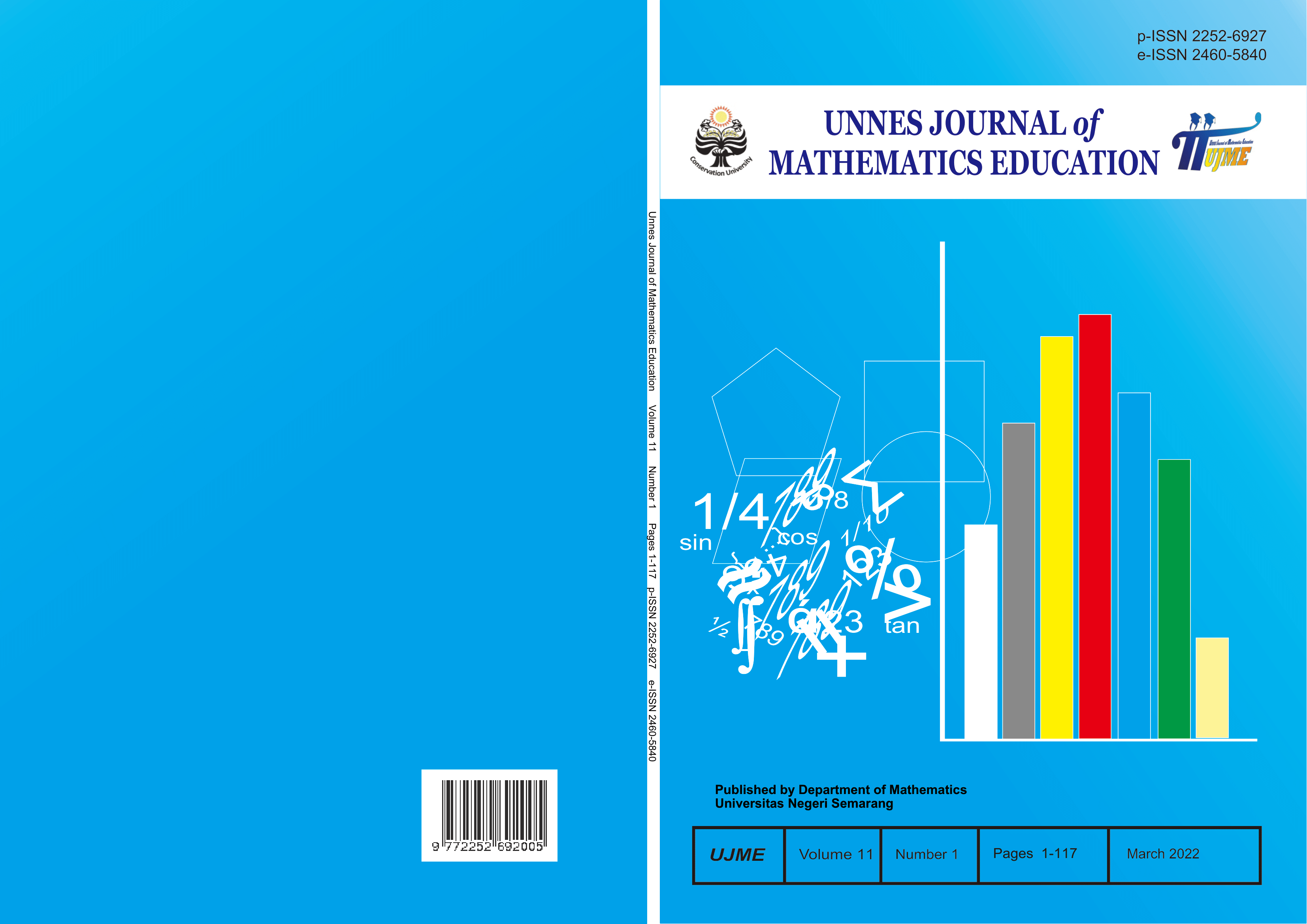Meta analysis of learning models in improving Higher Order Thinking Skills (HOTS) in junior highs school mathematics learning
##plugins.themes.academic_pro.article.main##
Abstract
The Industrial Revolution 4.0 requires students to have Higher Order Thinking Skills (HOTS). To achieve this aim, an effective learning models is needed with various cosiderations. Many studies have been conductes and provide different conclusions, so that new problems arise regarding which learning models is considered more influential in improving students’ HOTS. This study aims to find, compared, and analyzed learning models that have been used in improved HOTS at the junior high school level. The method used being narrative meta-analysis. The subjects of this study were 2 (two) articles that met inclusion criteria and had passed the PRISMA procedure. The result showed that the effect size values for each group of Project Based Learning (PjBL) assisted by Geogebra, Challenges Based Learning (CBL) and Problem Based Learning (PBL) were 3.27, 2.25, and 1.09. This shows that PjBL assisted by Geogebra have a greater influence than other learning models because the synrax of the learning model applied and the learning media used.
##plugins.themes.academic_pro.article.details##
References
Asyafah, A. (2019). Menimbang Model Pembelajaran (Kajian Teoretis-Kritis atas Model Pembelajaran dalam Pendidikan Islam). TARBAWY : Indonesian Journal of Islamic Education, 6(1), 19–32.
Becker, K., & Park, K. (2011). Effects of integrative approaches among science, technology, engineering, and mathematics (STEM) subjects on students’ learning: A preliminary. Journal of STEM Education, 12(5), 23–38.
Dwirahayu, G., & Musyrifah, E. (2021). EDUKATIF : JURNAL ILMU PENDIDIKAN Challenge Based Learning Dalam Meningkatkan Kemampuan Berpikir Kreatif Siswa Pada Materi Persamaan Linear Satu Variabel. 3(5), 1942–1956.
Fitri, H., Dasna, I. W., & Suharjo, S. (2018). Pengaruh Model Project Based Learning (PjBL) Terhadap Kemampuan Berpikir Tingkat Tinggi Ditinjau dari Motivasi Berprestasi Siswa Kelas IV Sekolah Dasar. Briliant: Jurnal Riset Dan Konseptual, 3(2), 201.
Ganeshkumar, P., & Gopalakrishnan, S. (2013). Systematic reviews and meta-analysis: Understanding the best evidence in primary healthcare. Journal of Family Medicine and Primary Care, 2(1), 9.
Helmawati. (2019). Pembelajaran dan Penilaian Bebasis HOTS. Bandung: Remaja Rosdakarya.
Ialongo, C. (2016). Understanding the effect size and its measures. Biochemia Medica, 26(2), 150–163. https://www.ncbi.nlm.nih.gov/pmc/articles/PMC4910276.
Junita, S. (2016). Peningkatan Kemampuan Creative Problem Solving Matematis Siswa Smp Dengan Pendekatan Challenge Based Learning. Jurnal Pengajaran MIPA, 21(1), 19–23.
Karada Ğ, E. (2015). Leadership and organizational outcomes: Meta-analysis of empirical studies. Leadership and Organizational Outcomes: Meta-Analysis of Empirical Studies, June 2017, 1–273.
Leijon, M., Gudmundsson, P., Staaf, P., Christersson, C., Gudmundsson, P., Staaf, P., & Christersson, C. (2021). Challenge based learning in higher education – A systematic literature review literature review. Innovations in Education and Teaching International, 00(00), 1–10.
Liberati, A., Altman, D. G., Tetzlaff, J., Mulrow, C., Gøtzsche, P. C., Ioannidis, J. P. A., Clarke, M., Devereaux, P. J., Kleijnen, J., & Moher, D. (2009). The PRISMA statement for reporting systematic reviews and meta-analyses of studies that evaluate health care interventions: explanation and elaboration. In Journal of clinical epidemiology (Vol. 62, Issue 10). https://doi.org/10.1016/j.jclinepi.2009.06.006.
Retnawati, H., Apino, E., Kartianom, Djidu, H., & Anazifa, R. D. (2018). Pengantar Analisis Meta (Issue July).
Peraturan Menteri Pendidikan dan Kebudayaan Republik Indonesia Nomor 22 Tahun 2006 Tentang Standar Isi (Decree of The Indonesian Minister of Education and Culture Number 22, 2006).
Suherman, Prananda, M. R., Proboningrum, D. I., Pratama, E. R., Laksono, P., & Amiruddin. (2020). Improving Higher Order Thinking Skills (HOTS) with Project Based Learning (PjBL) Model Assisted by Geogebra. Journal of Physics: Conference Series, 1467(1).
Wahida, F., Rahman, N., & Gonggo, T. (2015). Pengaruh Model Pembelajaran Berbasis Proyek terhadap Keterampilan Berpikir Kreatif dan Hasil Belajar Siswa Kelas X Sma Negeri 1 Parigi. Sains Dan Teknologi Tadulako, 4(3), 36–43.
Yulianto, T., Pramudya, I., & Slamet, I. (2019). Effects of the 21st Century Learning Model and Problem-Based Models on Higher Order Thinking Skill. 749–755.
Yulisman, B. P., & Faradila, I. (2019). Meta Analisis Implementasi Landasan Pendidikan dalam Pengembangan Buku Siswa Dengan Menggunakan Model Problem Based Learning Untuk SMA Dosen Program Studi Magister Pendidikan Fisika Pascasarjana FMIPA UNP 5(1), 81–88.
